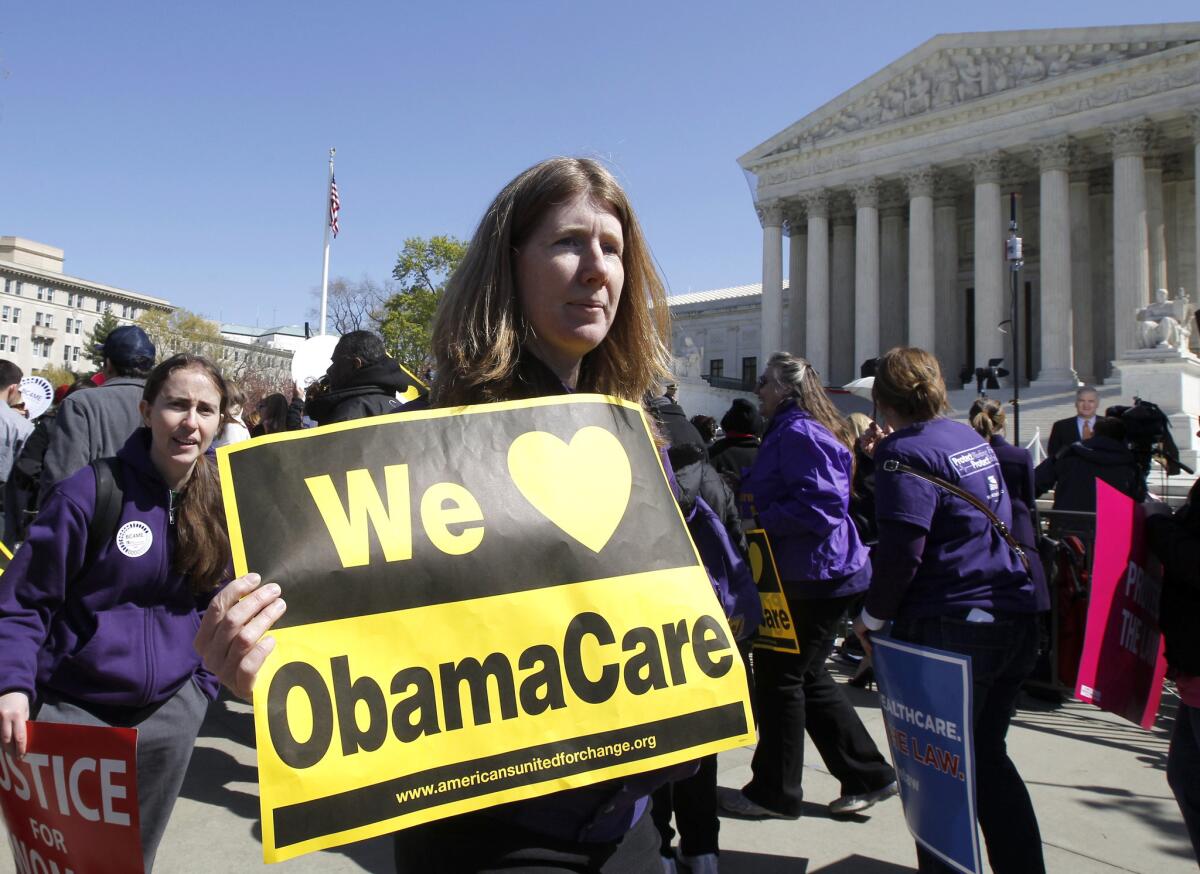Show some gratitude for Obamacare: A wonderful thing is happening in America

In four months, I will observe a strange anniversary: 20 years since the day I almost died.
I was 11 years old and being treated for a severe case of Crohnâs disease, an autoimmune digestive disorder. I could barely hold down food and was checking in and out of Johns Hopkins Hospital for stays of two to six weeks, my medication weakening my bones until my spine compressed and fractured. Eventually the doctors installed a catheter just above my heart that delivered nutrition intravenously, bypassing my digestive system. But when the line became infected with fungus, I was rushed into surgery. The doctors said that if the fungal infection had lasted even a few more hours, Iâd have died. âWhat would it be like to be dead?â my pre-pubescent mind pondered as I convalesced.
In time things got better and today, thankfully, I am mostly healthy. But 20 years ago, looking out the window as we drove through the poorer neighborhoods of Baltimore around Johns Hopkins, contemplating my own mortality, my 11-year-old self began to wonder: What happened to kids whose parents didnât have money for doctors? Did they just die? Or live in misery? How could people let that happen? I didnât know it yet, but I was becoming a progressive.
To be clear: Iâm not saying progressives are the only ones who care about sick kids, or sick adults. Indeed, unbeknown to middle-school-me in 1994, many conservatives in Washington were promoting a market-based plan that would create near-universal access to healthcare. Years later, Gov. Mitt Romney got a version of that plan passed in Massachusetts â to the enormous benefit of people in his state â and when he ran for president in 2008, he was rightly praised by the Senateâs then most-conservative member, Jim DeMint, who said Romneyâs plan (which enacted an individual mandate to buy health insurance) was âsomething that I think we should do for the whole country.â Across the aisle, the plan was also embraced by Democratic presidential candidates Hillary Clinton and Barack Obama.
Unfortunately, as has been widely documented, Republican leaders accurately recognized after Obama was inaugurated in 2009 that their clearest route back to power was to make sure his initiatives failed. Republican leaders like Paul Ryan and Tom Coburn rejected policy ideas theyâd suggested just months earlier. Obama and Senate Democrats were practically desperate for a bipartisan agreement and pleaded with Republicans to bridge the relatively modest gap between their respective versions of the plan (the MIT economist who designed both Romneycare and Obamacare described them as âthe same bleeping billâ), but once it became clear that no compromise would be accepted, the Democrats passed the bill alone.
I watched that vote live on television with tears of happiness. For years, Iâd had to jump through hoops to get access to vital medications and surgical procedures, yet I still counted myself lucky because I knew people who couldnât get them at all. With the Affordable Care Act, Iâd be able to take personal responsibility and buy my own care.
Admittedly, both the law and its implementation have been flawed. People who arenât eligible for subsidies are in some cases having to pay more for their insurance; some healthy people are losing plans that only cover catastrophic injuries. The website roll-out was, of course, an embarrassing disappointment, and the necessity of executive orders to delay deadlines, clarify legalese and reconcile contradictory statutes has also been dispiriting, even though there are legal precedents.
But I also remember that the law had to be composed the way it was, in part, to navigate around procedural hurdles from opposing lawmakers, who disliked Obama more than they liked the healthcare framework that they themselves had developed. Additionally, the usual revision processes that most laws undergo was rendered moot by an opposition committed to gutting or repealing the law, not constructively amending it. Meanwhile, implementation was sabotaged, including blocking funding for HealthCare.gov while it was in development.
And while I appreciate the frustration of healthy people who had catastrophic-only coverage (which was often effectively a scam), they need to pay into the same insurance pool as everyone else while theyâre healthy. Otherwise, theyâll just wait until they get sick to buy high-quality coverage â which insurance companies can no longer deny them â effectively becoming free-riders on a system to which they never contributed. Thatâs why the mandate to buy insurance was created in the first place, and even people who donât get subsidies are generally getting fairer deals.
Given these realities, and given that the website is now working with a skyrocketing rate of enrollment, Iâm moving past disappointment and anger and beginning to smile. Because something wonderful is happening in America now. People like me are being afforded the freedom to be healthier â in some cases even to be alive. Thatâs a big deal.
And so, I have two requests:
1) If you arenât 100% sure what the ACA/Obamacare means for you, donât go on hearsay; take a look. I know people who thought they were getting screwed but then found better, cheaper care than they could get before. Others are getting coverage for the first time.
2) If you support the bill, shout the good news from the hills. The recent CBO report is good and the enrollment numbers are great, so encourage everyone you know, especially young people, to get covered. Donât be intimidated by scare stories; theyâre usually easy to debunk, and then you get to ask why, if the law is so bad, its opponents seem to have such a hard time finding stories that withstand scrutiny.
I request these things, by the way, not on behalf of my 31-year-old self; I ask on behalf of the 11-year-old kid, moving in and out of consciousness with a bedpan, broken back and veins flowing with fungus. I ask in the spirit of that moment when his doctors and nurses and surgeons are shouting at one another, unsure what to do, and his distraught parents ask, âWho has the final say?â And a trusted doctor says, âYou do.â
Millions of Americans â including, quite possibly, you reading this article â can finally have final say on care because of the Affordable Care Act. Because of the plan that conservatives had the vision to formulate and Mitt Romney had the courage to test drive. Because Barack Obama had the audacity to take it nationwide after conservatives changed their minds.
I call it âsequential bipartisanship,â and its fruits â however imperfect â remind me that as I approach the 20th anniversary of my own brush with death, it is indeed a good time to be alive.
ALSO:
The truth about the great American science shortfall
For women, guns in the home prove especially deadly
Want an America that works? Innovate, donât regulate.
Joel Silberman is a Los Angeles-based writer and the producer of such viral Web videos as âLegitimate Rapeâ Pharmaceutical Ad (TW) and Kids Do The News. Follow him on Twitter @Wordpeggio.
More to Read
A cure for the common opinion
Get thought-provoking perspectives with our weekly newsletter.
You may occasionally receive promotional content from the Los Angeles Times.










